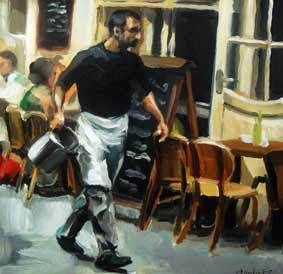Whenever I see an unlicensed shade-tree barbecue stand along the side of a Texas farm-to-market road, I think of history's first barbecue salesmen -- those famous outlaws, the buccaneers.
In the French West Indies, the word for a barbecue grill is boucan (from Tupi, a Brizilian language). Boucanee means smoked meat. Hence, "buccaneer" is derived from the French word for "barbecuer." The buccaneers were a ragtag crew consisting mainly of French and English outlaws and escaped slaves. They hid from the Spanish on the island of Tortuga off the northern coast of Hispaniola in the mid-1600s. Although they would later be known for their seafaring exploits, their original business was smoke-cured meat.
The buccaneers hunted the wild cows and pigs left behind the failed Spanish settlements on the island of Hispaniola. They smoke-cured the meat and sold it to the passing ships. Hunted themselves by the Spanish, the buccaneeers banded together for their own protection. Eventually they gave up on the meat business and went to sea. soon they discovered that capturing Spanish vessels by surprise attack was a lot more lucrative than chasing wild pigs. Before long, the buccaneers came to be known more as fearless seamen than as barbecue purveyors. But many would argue that it was in their first occupation that they made their most significant contribution to humanity.
Like the buccaneers, Texas barbecue joints are forever at odds with the authorities. Barbecue is, by definition, a primitive cooking process. The health laws in many Texas counties do not allow restaurants to cook outdoors. Many barbecue joints build tin roofs, screened porches, and other elaborate facades to bring the outdoor cooking indoors (at least technically). In outlaw tradition, the best barbecue generally comes from the joint that is in the most trouble with the health department.
If you are interested in the history of American cooking, then Robb Walsh is a must read.
If you are interested in the history of Texas cooking, then Robb Walsh is a
must read.
If you are interested in Texas cooking now as well as recipes on doing this yourself ... well you get the point.
Must read!Yes, I'm a fan.
He has covered barbecue, Tex-Mex, and cowboy cooking with historical information, oral tradition, restaurant information, and current day cooking and tastes. He does his own research, takes his own photos when those he can find won't do, and makes it all so easy to read that you don't feel as if you are absorbing history.
Excerpts tend to speak better for his cookbooks than I can do.
The Tex-Mex Railway
"Tex-Mex" first entered the language as a nickname for the Texas and Mexican Railway which was chartered in 1875. Newspaper railroad schedules used the abbrreviation "Tex. Mex." for the rail line which ran from Laredo to Corpus Christi.
The Oxford English Dictionary has cited a 1941 Time magazine quote as the first use in print, but several earlier citations appear in small-town newspapers. An earlier use of the hyphenated form is found in this May 23, 1922, citation from the Mexia Evening News (Mexia, Texas): "... the new town of Marindo City on the Tex-Mex Railway, where oil is loaded ..."
The term came to be used across the U.S. to describe people of Mexican ancestry in Texas as in this item from The Gastonia Daily Gazette (Gastonia, North Carolina) May 29, 1926: "One year the offering went to the Tex-Mex school, the School for Mexicans on the Texas side." On September 19, 1928, the Newark Advocate (Newark, Ohio) published this definition: "Q. What are Tex-Mex? A. Texas-born Mexicans."
But what about the recipes I can hear you saying.
What about cooking from these books?Good question and, sadly, all my appreciation comes from reading the books as I have been doing basic subsistence cooking lately. However, I feel myself shaking that mood off and plan to make this recipe soon. For more concrete appreciation, check out
Homesick Texan who not only cooks from these books but has actually spent time cooking with Robb Walsh!
Sweet Potatoes Baked in Cane Syrup
How long you bake it depends on how wet the potatoes are, Mama Sugar Sanders cautions. If the sweet potatoes give off a lot of water, increase the baking time until the liquid is reduced.Serves 8
2 tablespoons butter
3 pounds sweet potatoes, peeled and cut into 1/2-inch slices
1 cup
cane syrup1/2 cup sugar
Preheat the oven to 350. Butter a medium baking dish.
Layer the sweet potato slices in the prepared baking dish. Pour the cane syrup over the top and dot with the remaining butter. Bake for 30 minutes. Remove the baking dish from the oven and tun with a spatula so the top slices are on the bottom and the bottom slices are on top. Sprinkle with the sugar and return to the oven. Bake for 20-30 minutes more, until the juices have thickened into a syrup. Remove the pan from the oven and press down on the potato slices with a spatula so they are submerged in the juices. Allow to cool for 30 minutes before serving.

